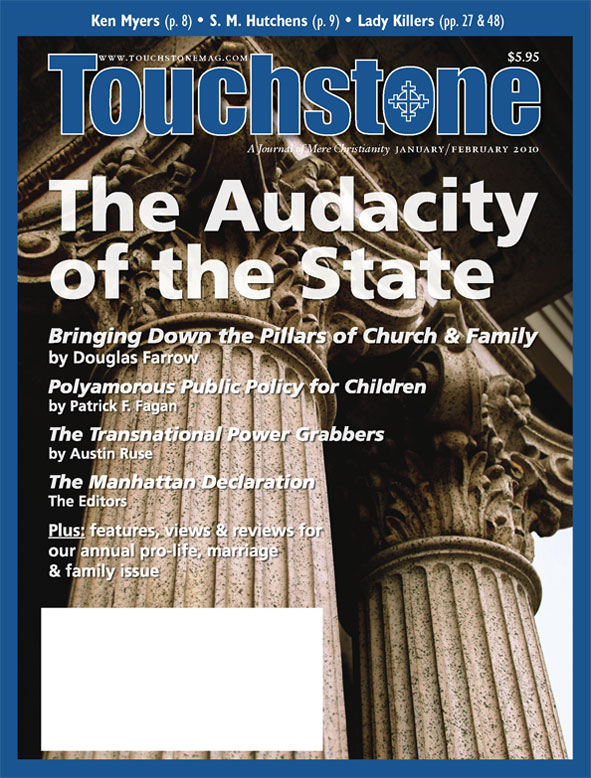Contradeception
Rebekah Curtis on the Public Nature of Marital Privacies
Our four ex utero kids are generally well-behaved, or so we’re told. But occasionally they do something spectacularly disobedient, and even more incredibly, they fail to make any serious effort to conceal it. This infuriates their father. If they’re going to do something that dumb, he growls, they should at least be clever enough to keep us from discovering them at their sin.
However, I salute their stupidity. I take it as a sign that though the children are disobedient, they have at least sinned simply and honestly. Their sin is impulsive, not deceptive; it is primarily of the flesh and not the devil. They sin with desire but without duplicity. They sin as I wish I sinned.
Their sin reminds me of a time when I would say of a couple of friends “in trouble,” “If you’re going to be stupid, at least be smart about it.” Their stupidity led to their exposure, their excruciating confessions to parents, their hurried marriages, the incongruity of birthdays and anniversaries in their family histories. At the time when I had such sophisticated advice to offer, it did not occur to me that this counsel amounted simply to adding deception to their sin.
Signs of Health or Brokenness
Sexual relationships, while enacted privately, are public property. The lover declares, “I am my beloved’s and my beloved is mine.” This protects the relationship from internal and external breach. Those within the relationship are bound to each other by their promise of troth, held in trust by the neutral third parties who witness the promise. Those outside the relationship know that this new unit of their community is being rightly founded, and also that any attempt to besiege the promise is illicit. The vow of complete self-giving is sanctioned by those present, and its publicity makes it safe to carry out. Thus would a bride in former times blush—all those gathered in her honor knew what she would be doing in just a few hours.
And in former times, when the married couple fulfilled their vows to God and each other and their witnesses, they produced, at God’s favor, babies to prove it. The lack of a baby indicated either a broken body or a broken vow. While both called for the community’s prayer, the latter also called for the community’s assistance in healing the marriage for the benefit of everyone, for a broken vow means broken people. When a baby gave evidence of a union where no vow had been made, it was similarly in the interest of the community to correct the situation in the way that would most benefit all the parties involved.
In marriage, a couple gives over supervision of their marital health to those who approved their avowal. A sexual relationship between people who made no vows would normally not remain a secret for long. But contraception blinds the community by concealing the sexual act outside of marriage, or its absence within marriage, and by leaving goods damaged in various ways unmarked as such.
The heartbroken suffer alone in hijacked bodies. A relationship is known to be serious (since sex is no longer a mark of gravity in a relationship) when both members unload the “baggage” of past relationships. Accountability is lost, and there is little opportunity for prevention. We are all left to pick up someone’s pieces when it is too late, and without help, since these matters are private.
This is not to advocate public shaming. The Church is not a place of shame, for Christ covered shame with his naked death. But the shame of sexual immorality torments even if it is not widely known.
Every member of the community profits from a protective mechanism against such shame. Two people cannot become one flesh without being personally affected, and the shock waves their union generates change the community. Publicizing the event allows the community to approve, prepare for, and absorb the change. Extramarital unions infect the community with diseases of body and soul. Atrophied unions weaken the community in body and soul. A community that has been deprived of its primary diagnostic tool for identifying an ill or illicit union is less able to remedy itself.
Unacknowledged Debt
Why must we have physical, public evidence of the faithful fulfillment of even those marital vows most of us can’t imagine neglecting, at least at first? Who would lie about such things? Well, who would talk about them? Allowing nature to manifest our faithfulness is certainly more graceful than a verbal report.
Contraception, now the status quo, also puts the burden of disclosure on the tragically infertile. They are forced to openly deny contraceptive use to prove their faithfulness. The involuntarily childless must actively solicit the sympathy of friends and the prayers of the Church, giving painful birth only to words that express their sorrow.
The fruits that proceed from the union of lovers bear witness to the lovers’ faithfulness to their public vow. This is the pain of infertility: a union unconfirmed, a love lacking its plainest proof.
This is also why the Church perceives discord in the decision of a newly married couple to take a few years to “enjoy being married” before ending marital enjoyment with children. Apparently, we are expected to take them at their word that they are fulfilling the vows made before us, although they refuse to tender the token. In those storied former times, we’d have worried that perhaps the sweet things weren’t quite sure how things worked. For now, charity ordains that we fill in the child-shaped marital deficiency with the sad assumption of trouble conceiving, except in the great majority of cases, where bride and groom make no secret of being confirmed window shoppers at the baby mall. If you’re going to be married, be smart, after all. Be ever copulating but never conceiving. Their debt to their witnesses (to say nothing of each other) goes quite unacknowledged.
So also is the public treated disrespectfully by the couple who, 2.1 children later, give no sign of continued faithfulness to their vow. Is he so disgusted by the sight of his wife’s birth-changed body that he will no longer suffer its embrace? Is she using her maternal exhaustion as an excuse to withhold herself from him? Can this marriage survive? The only way we know a marriage to be sexless is when it comes out in therapy, on the golf course, at playdates, on the pages of The Atlantic.
On the other hand, those inclined to give evidence of ongoing sexual success can simply mention recent adventures to friends. We no longer provide pregnancies to testify to our faithfulness, for faithfulness is no longer a positive act or a community act. It is simply the failure to pursue gratification elsewhere. Furthermore, to whom could we possibly owe testimony? Sex is private.
“Safety” in Secrecy
Outside of marriage, contraception permits sexual sin without public consequence. The public, for the most part, no longer cares, but the Church certainly must. Those who accept contraception as legitimate within marriage set up their children to succumb not only to lust, but also to guile. Fornication super-enabled by contraception leads the young away from marriage and into a life of secret sin behind closed doors on which no one has a right to knock.
The Christian couple “in trouble” faces more shame now from the Christian community than in ages past. With so many opportunities to conceal an illicit relationship or even an illicit pregnancy, those couples who must admit publicly to a sin considered private assume a largely avoidable humiliation. They’re concupiscent and stupid.
Christian parents are tempted to hope that if their kids mess up, they will at least be “safe” about it. The young have to be taught, with subtlety of course, that for everyone to remain happy, they must plan their sins and take measures to prevent these sins from coming to light. Veniality is far too risky.
The people we seek to keep safe are ourselves. There is nothing safe about “safe sex” besides an external reputation. As long as no one knows, we can still participate in society’s grotesque nuptial parodies. Our daughters flounce down the aisle in ironic white gowns, naked from the cleavage up; our sons save for honeymoons on which the couple, drained by months of preparing for the exhibition of extravagance, can finally get some sleep. We smile about how our darlings waited—or if they didn’t, about how they at least were smart enough not to let it become a problem.
Empty Glasses
But as go the banns, so go babies. Our churches must grow, but our families must be reasonably sized; our sex must be fantastic but never dutiful; our food is organic but our love is not. We sip from empty glasses and sing the expressiveness of the wine. True love waits, or if that’s too hard, it can be made to appear to wait. And after the official waiting is over, love need show nothing for itself but a naughty grin. •
Rebekah Curtis is the co-author of LadyLike (Concordia, 2015), and her essays have appeared in Touchstone, Chronicles, Salvo, Modern Reformation, and Lutheran Forum, among other publications. She attends a congregation of the LCMS.
subscription options
Order
Print/Online Subscription

Get six issues (one year) of Touchstone PLUS full online access including pdf downloads for only $39.95. That's only $3.34 per month!
Order
Online Only
Subscription

Get a one-year full-access subscription to the Touchstone online archives for only $19.95. That's only $1.66 per month!
bulk subscriptions
Order Touchstone subscriptions in bulk and save $10 per sub! Each subscription includes 6 issues of Touchstone plus full online access to touchstonemag.com—including archives, videos, and pdf downloads of recent issues for only $29.95 each! Great for churches or study groups.
Transactions will be processed on a secure server.
more from the online archives
calling all readers
Please Donate
"There are magazines worth reading but few worth saving . . . Touchstone is just such a magazine."
—Alice von Hildebrand
"Here we do not concede one square millimeter of territory to falsehood, folly, contemporary sentimentality, or fashion. We speak the truth, and let God be our judge. . . . Touchstone is the one committedly Christian conservative journal."
—Anthony Esolen, Touchstone senior editor









